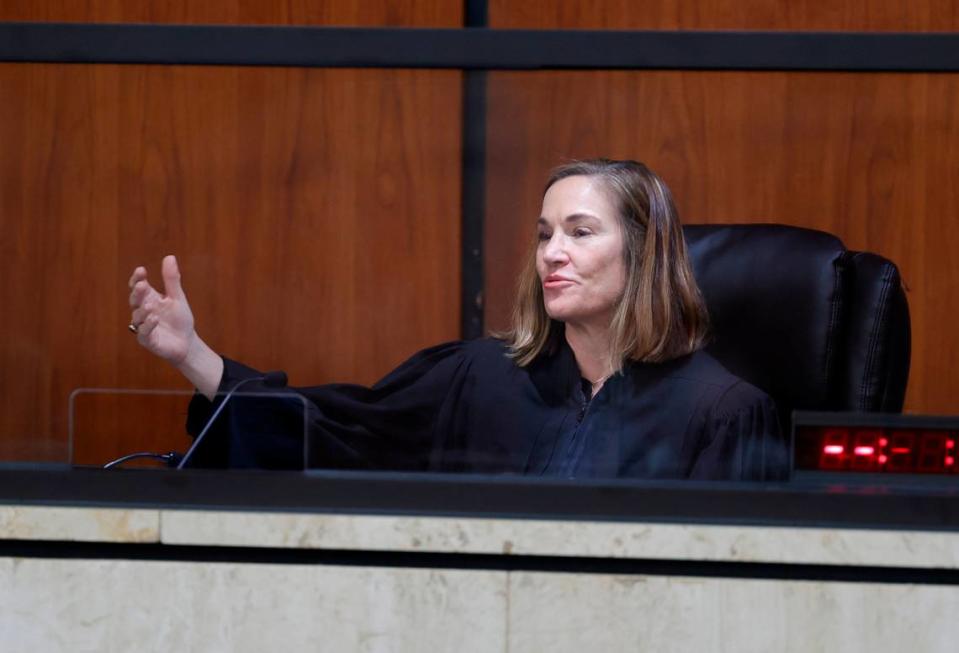Judge to decide whether to dismiss charges against Quinn, alleged kingpin of corruption scandal
After a nearly two-hour hearing Friday, the issue of whether to keep alive or dismiss state grand jury perjury and obstruction of justice charges against legendary Republican consultant Richard Quinn Sr. is now in the hands of a state judge.
Judge Carmen Mullen said she would weigh a variety complex legal matters, including the relevance of a 2021 State Supreme Court opinion on corruption charges against a former state representative, whether Quinn was afforded due process and whether prosecutors were right to have Quinn testify in front of a state grand jury where he made statements that resulted in his indictment. She said she would rule “sooner than later.”
Those issues were argued Friday at the Richland County courthouse before Mullen by special prosecutor Barry Barnette, who wants to put Quinn on trial, and Quinn attorney Cindy Crick, who wants the charges thrown out.
At the hearing’s end, Quinn was arraigned and allowed to stay out on bond. He was indicted by a state grand jury in May 2021 on 12 counts of perjury and two counts of obstruction of justice, but never formally charged.
Quinn, 77, the alleged mastermind of a secretive General Assembly influence peddling ring, has since 2017 been a target in a wide-ranging state grand jury corruption investigation that has resulted in convictions of several major Republican state lawmakers who received secret payments from Quinn’s firm. One of them, former Rep. Jim Harrison, R-Richland, was convicted after a 2018 jury trial and sent to prison. Evidence showed he for years had not disclosed he took about $85,000 a year from Richard Quinn & Associates.
Quinn also was a political consultant for numerous high-profile Republican office holders, including Gov. Henry McMaster, U.S. Sen. Lindsey Graham, Attorney General Alan Wilson and his father, U.S. Rep. Joe Wilson of Lexington County. Quinn also represented the interests of major institutions such as the University of South Carolina and the former SCANA electric utility.
Mullen said that perhaps the hardest issue to resolve is where different notions of justice clash: if it can be shown that Quinn is being improperly prosecuted, does that mean he should be excused for any lying he did before a grand jury, even though telling the truth in a criminal investigation is a bedrock principle?
“You can’t lie in front of a grand jury,” Mullen mused toward the hearing’s end. “On the flip side, if the prosecutor didn’t have the authority to bring him in front of a grand jury, that’s equally problematic.”
Saying there are “two opposing concerns,” Mullen said to the attorneys, “It’s like trying to weigh which Bill of Right is most important — they’re all important.”
Quinn attorney Crick quickly told the judge she should rule on Quinn’s side because the way in which the prosecution arrived at its charges was tainted.
“You’ve got to give the benefit to someone whose life and liberty are at stake and being jeopardized,” Crick said.
However, earlier in the hearing, Barnette had told the judge no one who lies to a grand jury should get a free pass.
“You can’t commit perjury in front of a grand jury — perjury is perjury, that is the bottom line in this case,” Barnette said.
Barnette had inherited the Quinn case from former special prosecutor David Pascoe, who stepped down from the post in 2021 after for years leading one of the most successful state investigations into General Assembly corruption.
As part of Pascoe’s investigation, he brought Quinn before a state grand jury in 2018, after having said publicly that if Quinn lied to grand jurors, he would be prosecuted for perjury.
Quinn’s lawyers now argue that by prosecuting Quinn for perjury, Barnette is violating a 2017 agreement Pascoe reached with Quinn in which Pascoe promised not to prosecute Quinn if one of Quinn’s firms pleaded guilty to a misdemeanor charge of failing to register as a lobbyist and paid a fine. Quinn made the plea, and that agreement was supposed to “bring finality” to Pascoe’s prosecution of Quinn, Crick said.
In arguing to Mullen on Friday, Crick also accused Pascoe of being an overzealous prosecutor who “corrupted the process” by trying to lay a “perjury trap” for Quinn.
Told about Crick’s statements by a State newspaper reporter, Pascoe said later Friday, “I take comments like that with a grain of salt. That’s what some defense attorneys are paid to say. You hear that same thing about almost every public corruption prosecutor.”
In defending his and Pascoe’s actions, Barnette told the judge that while the charges against Quinn where based on Quinn’s 2018 statements to a grand jury, he (Barnette) had a new state grand jury indict Quinn for perjury last year. Moreover, the Attorney General’s office had granted him “full prosecutorial discretion” in deciding what to do with Pascoe’s old cases, including the case against Quinn.
Friday’s challenge to the indictments in Barnette’s case were just the latest of numerous legal challenges to corruption cases originally brought by former special prosecutor Pascoe.
One of the few successful challenges came in 2021, when the S.C. Supreme Court threw out two misconduct in office charges Pascoe had brought against former Rep. Harrison, ruling that Pascoe exceeded his authority in prosecuting Harrison on those charges. But the high court let stand Harrison’s perjury conviction for lying to the grand jury. Harrison was sentenced to 18 months in prison and was let out after serving a shortened sentence.
Barnette’s prosecution team includes assistant solicitor Jennifer Jordan.
Besides Crick, Quinn’s defense team includes attorneys Rauch Wise and Shaun Kent. All three are high-dollar veteran criminal defense lawyers.



